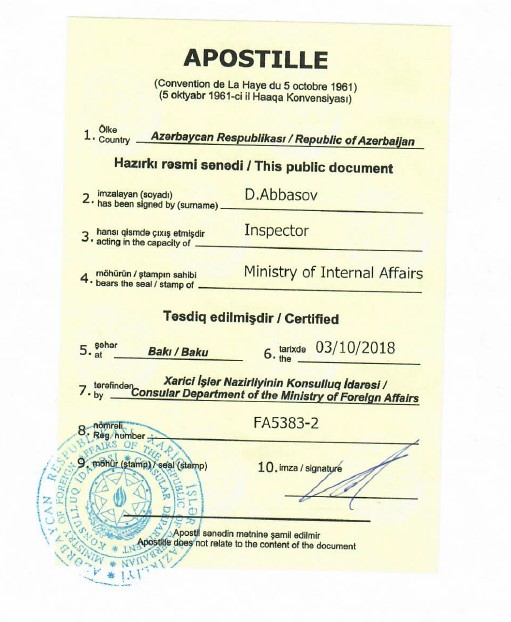
Schmidt & Schmidt компаниясы Әзербайжанда берілген мемлекеттік үлгідегі құжаттарды апостильдеу және заңдастыру қызметтерін ұсынады.
Әзербайжан Республикасы 1961 жылғы 5 қазанда қабылданған және құжаттарды апостильдеу арқылы жеңілдетілген тәртіппен заңдастыру рәсімін белгілеген Гаага конвенциясына қатысушы ел болып табылады. Әзербайжан 2004 жылғы 13 мамырда конвенцияға қосылып, 2005 жылғы 2 наурызда ол Республика аумағында заңды күшіне енді.
Әзербайжанда апостиль — әр жағы кемінде 9 сантиметр болатын төртбұрышты мөр, мәтіні азербайжан және ағылшын тілдерінде, міндетті түрде «Apostille» атауы мен 1961 жылғы Гаага конвенциясына француз тіліндегі сілтемені (Convention de La Haye du 5 octobre 1961) қамтиды. Мөр мазмұны Гаага конвенциясымен белгіленген.
Әзербайжанда құжаттарды апостильмен куәландыруға уәкілетті органдар
- Сыртқы істер министрлігі
- Әділет министрлігі
Әзербайжан Республикасы Әділет министрлігінің тіркеу және нотариат басты басқармасы соттар, мемлекеттік прокурорлар және азаматтық хал актілерін тіркеу органдары берген құжаттарды, сондай-ақ олардың нотариалды көшірмелерін апостильмен куәландырады.
Әзербайжан Республикасы Сыртқы істер министрлігі Әділет министрлігінің құзыретіне кірмейтін басқа құжаттарды, соның ішінде білім беру құжаттарын апостильдейді.
Әзербайжанда құжаттарды апостильдеу үшін оларды уәкілетті министрліктерге тікелей немесе Баку қаласындағы Бірінші нотариалды кеңсе арқылы тапсыруға болады.
Белгілі бір билік органдарына қатысты мекемелер берген құжаттар апостильге жібермес бұрын, құзыретті ведомстволар тарапынан алдын ала куәландырылуы тиіс.
Әзербайжанда берілген құжаттар, апостильмен заңдастырылып, нотариуспен куәландырылған аудармасы болса, Қазақстанда заңды күшке ие болады. Апостильмен куәландырылуы мүмкін құжаттар — Әзербайжан билік органдары мен ресми мекемелері берген, азербайжан тілінде жасалған құжаттар.
Әзербайжан Республикасында құжаттарды заңдастыру процесі уәкілетті лауазымды тұлғалар арқылы олардың түпнұсқалығының тексерілуін қамтиды. Осы рәсімнен өткеннен кейін құжатқа (немесе оның куәландырылған көшірмесіне) арнайы мөр — апостиль қойылады. Көп жағдайда апостиль құжаттың артқы бетіне немесе жеке параққа қойылып, кейін құжат бірге тігілетін болады.

Әзербайжанда апостильмен куәландырылуы мүмкін құжаттар
- Орталық және жергілікті билік органдарының құжаттары
- Сот құжаттары
- Нотариалды актілер
- Әкімшілік құжаттар
- Тіркеу құжаттары
- Біліктілік және сертификаттау құжаттары
- Мемлекеттік реестрлердің үзінділері
Апостиль қойылмайтын құжаттарға кедендік, дипломатиялық, консулдық, коммерциялық құжаттар, паспорттар және басқа жеке куәліктер жатады. Апостильдің қолданылу мерзімі шектелмеген, бірақ құжаттардың өз жарамдылық мерзіміне шектеулер қойылуы мүмкін.
Апостиль қолданылмайды
Маңыздысы, 1961 жылғы 5 қазандағы құжаттарды жеңілдетілген түрде заңдастыру туралы Гаага конвенциясының әрекеті Әзербайжан мен келесі мемлекеттер арасындағы қатынастарға қолданылмайды: Косово және Германия.
Бұл дегеніміз, аталған елдер өзара құжаттарды заңдастыру үшін апостиль қолданбайды. Мұндай жағдайда консулдық заңдастыру немесе үкіметаралық ынтымақтастық аясында құжаттарды тексеру рәсімі қолданылады.
Апостиль мен консулдық заңдастыру арасындағы айырмашылықтар
Апостиль мен консулдық заңдастырудың ортақ белгісі – олар ресми құжаттың басқа елдің мекемелерінде қолданылуы үшін шынайылығын растайды. Алайда олардың арасында елеулі айырмашылықтар бар.
| Апостиль | Консулдық заңдастыру | |
|---|---|---|
| Шындық | Тек Гаага конвенциясына қатысушы елдер арасында ғана қолданылуы мүмкін. | Гаага конвенциясына қатыспайтын немесе қатысушы еместігінен бір немесе екі ел арасында, немесе бір тарап екінші тараптың қосылуына қарсы болған жағдайда қолданылады. |
| Алу қиындығы | Орташа. Апостиль алу үшін құжат берілген елдің уәкілетті органыға жүгіну қажет. | Жоғары. Консулдық заңдастыру үшін құжат берілген елдің әртүрлі органдарына және консулдықтарға жүгіну қажет |
| Алдын ала растау | Қажет емес. | Қажет. Құжатты берген органнан алдын ала растау қажет. |
| Мақсат елінің консулдығында заңдастыру | Мақсат елінің консулдығына жүгіну қажет емес. | Заңдастырудың соңғы кезеңі әдетте құжат берілген елде мақсат елінің консулдығында өтеді. |
Әзербайжанда құжаттарды талап ету
Кейде азаматтық хал актілері құжаттары жоғалып кетуі немесе зақымдануы мүмкін, немесе құжаттардың өзекті көшірмелерін алу қажет болады. Мұндай жағдайда құжаттардың дубликаттарын алу керек. Көп жағдайда бұл рәсімде қиындықтармен Әзербайжаннан көшіп кеткен адамдар кездеседі. Біздің қызметіміз арқылы сіз құжаттарды Әзербайжанда қашықтықтан ала аласыз және біз оны әлемнің кез келген нүктесіне курьерлік жеткізуді жүзеге асыра аламыз.
Әзербайжан құжаттарының нотариалды аудармасы
Азаматтық хал актілерінің көшірмелері мен дубликаттары кез келген тілге Әзербайжандағы присяжный аудармашы арқылы аударылуы мүмкін немесе аударма тағайындалған елде жасалуы мүмкін. Біз азаматтық хал актілері құжаттарының нотариалды аудармасын және олардың кейінгі куәландырылуын ұсынамыз. Жұмыстың құны нақты құжаттың көлеміне байланысты есептеледі.
























































